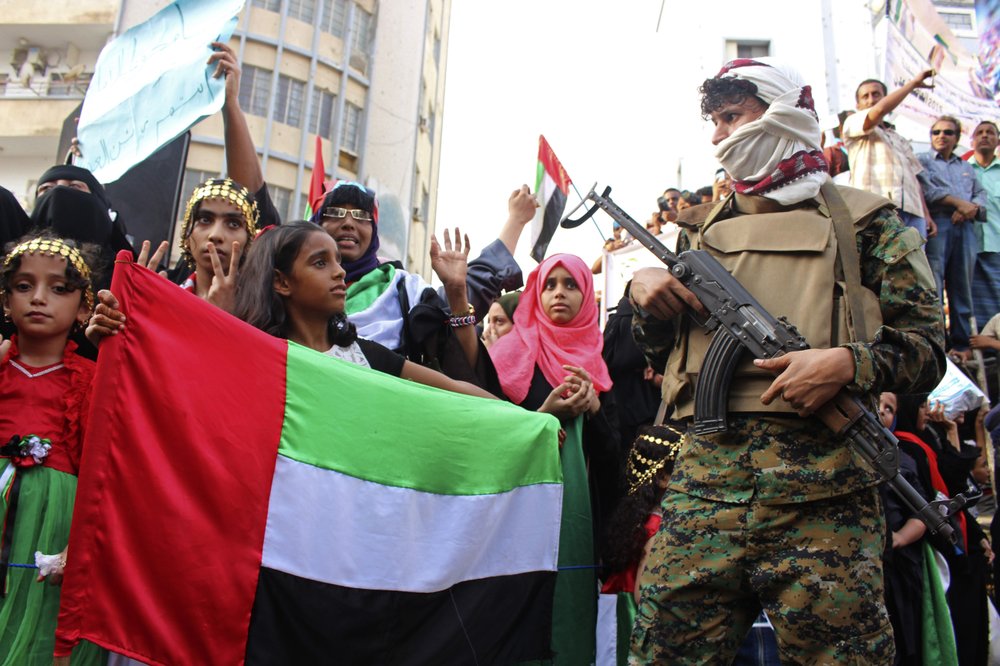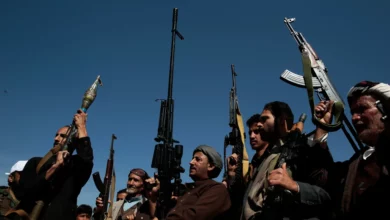Sanaa–A coalition of tribal sheikhs has succeeded in preventing the Yemen-based Al-Qaeda in the Arabian Peninsula (AQAP) from taking over its districts.
The coalition accused the government of encouraging Al-Qaeda to spread its operations in some cities to create fear that regime change would allow the organization to engender more chaos.
Sheikh Hussein bin Saleh bin Othman, head of the Sheikh coalition to stop AQAP from spreading, particularly in Azan, Maifa’a, told Al-Masry Al-Youm that 800 sheikhs from various tribes gathered on a bridge in Azan earlier this week to give AQAP members a stern warning.
“We told them that they have to leave our land and that we will not be watching them taking over. We are the majority and there is no comparison,” said bin Othman.
He also said the state is urging AQAP to attack locals.
"The state wants to affect the country negatively and make the world think that Al-Qaeda is a real threat in Yemen so they will financially help (President Ali Abdullah) Saleh fight Al-Qaeda,” he said.
Around 50 AQAP members began controlling the roads in Maifa’a, a district in Shabwa Governorate, when Yemeni security forces withdrew from some cities recently. The tribes were able to identify the outsiders because the tribal societies know each other and belong to the same families.
“Our tribal power enables us to gather over 10,000 warriors in less than two days to fight Al-Qaeda,” said bin Othman.
He also said that Al-Qaeda members pretended to protect roads in the Raudha and Habban districts where security forces were absent. He said the tribes, not Al-Qaeda, are capable of protecting the roads.
The sheikh coalition elected a 20-member supreme committee that runs smaller committees to protect and manage their community's daily affairs.
“We managed to expel Al-Qaeda from our area and that is proof that they are urged by the state for political reasons and not Islamic reasons as they claim,” said bin Othman. “If they belong to the real Al-Qaeda then they wouldn’t appear in and out of governorates where no American or British people that they want to attack are allowed. In these places [there is] no one but locals, so who would they attack or fight?”
The tribes also set up more than 13 public committees to man checkpoints on various roads.
“Each tribe is committed to protect an area all day and night,” said bin Othman.
Judge Hamoud al-Hitar, the former minister of religious affairs who was head of the Yemeni government’s dialogue committee with Al-Qaeda in 2006, said at a demonstration in the capital Sanaa last Friday that President Saleh's regime was promoting terrorism.
He also said Yemen would be free of terrorism if Saleh steps down.
“Saleh uses Al-Qaeda to blackmail foreign countries so that he can get more financial support from them. But the reality of Al-Qaeda's existence in Yemen doesn’t exceed even 10 percent of what the official Yemeni media promotes,” said al-Hitar.
Saleh al-Shabwany, whose brother Jaber was deputy governor of Mareb Governorate and a mediator between AQAP and the government, warned that if the political and security situation continues to deteriorate, the threat that AQAP presents will increase.
His brother Jaber was killed by the US air strikes in late 2009 that reportedly targeted AQAP strongmen in Mareb. Jaber was working to reduce the threat of Al-Qaeda in his governorate and was mediating with a wanted AQAP member when the US military struck.
“After Jaber’s murder, Al-Qaeda started to spread widely again because his efforts in the area were lost. Al-Qaeda members aren’t allowed in mosques or to move around publicly,” said al-Shabwany.
Al-Shabwany has demanded justice from the Yemeni authorities after his brother’s death, but has received no assistance. In retaliation, the family damaged a power plant in Mareb in March this year to pressure the Yemeni government to investigate their son’s murder.
Ahmed al-Zurqa, a political analyst who specializes in Al-Qaeda, said that international concerns have been raised in recent weeks as AQAP gains power in certain areas of the country.
“The international community and the West in particular are now aware that Al-Qaeda remains a threat to Yemen. They have taken notice of events of the past two weeks and especially after what happened in Ja’ar Province [where Al-Qaeda took control of the presidential complex and state-run radio and looted an official ammunitions factory],” said al-Zurqa.
However, al-Zurqa also said that the latest speech from US cleric of Yemeni origin Anwar al-Awlaki, who is believed to be in Yemen, gave the impression that AQAP supported “revolutions as the way to get rid of dictatorship.” There is the potential that AQAP will scale back its Yemeni operations following a regime change.
“Al-Qaeda is a now a threat more than what it could be after the regime withdraws. They will lose their social credibility and their sheltered environment and this will reduce their activities,” said al-Zurqa.
He also said that social and political motives have drawn young people to Al-Qaeda in the past, but with other outlets for their dissent, dissatisfied youths may not be as attracted to extremism.
According to al-Zurqa, there are three AQAP branches in Yemen. The first belongs to its main leader Osama Bin Laden. The second belongs to the Saudi Arabian intelligence and has substantial activities and impact in the country, and the third, according to al-Zurqa, is run by the Yemeni regime.




